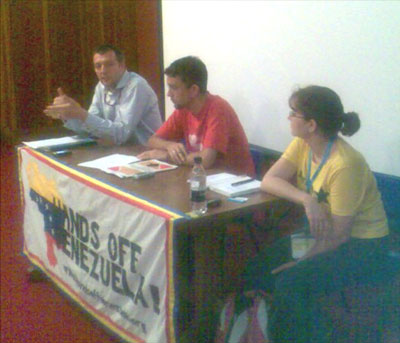Hands Off Venezuela’s TUC Fringe Meeting – “Workers’ Control in Venezuela”
- 14 September 2006
 After the screening of the excellent short documentary “Venezuela Today, the World Tomorrow?”, Jorge MartÃn, international secretary of the HOV campaign, was next to speak. Jorge pointed out that oil workers in Venezuela were somewhat different to other sectors since they had higher wages and better benefits, and were fed the idea that they were separate. But despite this, during the lockout, they managed to take over the running of this highly complex industry. The workers’ struggle is linked to the struggle against imperialism, showing that there is no need for bosses.
After the screening of the excellent short documentary “Venezuela Today, the World Tomorrow?”, Jorge MartÃn, international secretary of the HOV campaign, was next to speak. Jorge pointed out that oil workers in Venezuela were somewhat different to other sectors since they had higher wages and better benefits, and were fed the idea that they were separate. But despite this, during the lockout, they managed to take over the running of this highly complex industry. The workers’ struggle is linked to the struggle against imperialism, showing that there is no need for bosses.
Workers control had mainly been limited to bankrupt factories where workers have taken over and the plants have been expropriated by the state. The first such case was the paper mill Venepal (now Invepal) which was taken over for 3 months after it was declared bankrupt in 2005. It was expropriated under “co-management”, with the workers owning 49% of the factory and the state 51%. However, the workers have a majority on the board, and also have the decisive vote. This first expropriation has led to around 20 more, including 2 last week. At Invepal, many mistakes have been made following the workers takeover, but the workers moved quickly to solve the issue – they kicked out the management who had originally led the struggle but were now causing problems. This shows how the workers can solve their own problems.
The main difference in Venezuela is that the legal framework supports such activities, whereas in other countries workers face repression for carrying out these acts. Jorge ended by highlighting that although there are lots of contradictions in the worker control process, it is nevertheless an inspiration to workers everywhere.
For more information on the TUC delegation to Venezuela, and a review of the documentary, please see the latest issue of the Hands Off Venezuela magazine, available now.

 Please help build the campaign by
Please help build the campaign by